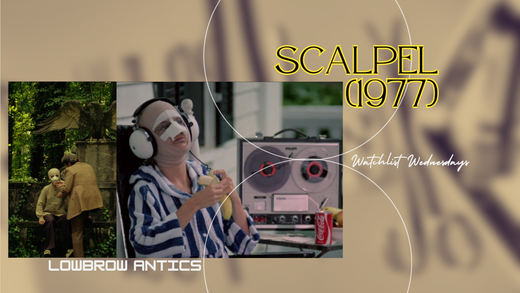If you’re in the mood for a pulpy, twist-filled exploitation film dripping with Southern Gothic style, Scalpel (1977) is a must-watch. Directed by John Grissmer, this under-noted gem is a mix of psychological thriller, melodrama, and exploitation cinema, featuring a sleazy southern storyline, a warped take on the twin trope, and a feminist-tinged twist that redefines its sordid narrative.
A Sleazy, Twisted Storyline
At its core, Scalpel follows Dr. Phillip Reynolds (Robert Lansing), a corrupt plastic surgeon who concocts a diabolical plan to claim a massive inheritance left to his estranged daughter, Heather (Judith Chapman). When Heather disappears after her father commits an unspeakable crime, Phillip transforms a near-dead patient into his daughter’s doppelgänger, intending to collect the fortune for himself, after convincing her to pose as Heather in front of family. What ensues is a chilling web of lies, manipulation, and betrayal that escalates into pure chaos. The story revels in its sordid details, leaning into the seedier side of human greed and ambition.

Southern Gothic Cinematography and Aesthetic
One of Scalpel’s standout features is its haunting Southern Gothic aesthetic, brought to life by cinematographer Edward Lachman. Long before he worked on films like The Virgin Suicides and Carol, Lachman infused Scalpel with a visual style that feels both eerie and positively grand. Set against the backdrop of decaying mansions, misty swamps, and shadowy yellow-toned interiors, the film oozes atmosphere, with every frame capturing the unsettling beauty of its fading Southern setting. Lachman’s use of lighting and framing heightens the tension, creating a dreamlike quality that amplifies the film’s tawdry narrative, while still bringing a much more refined style than other exploitation cinema. The contrast between opulence and decay mirrors the moral rot at the heart of the story, making the visuals just as compelling as the plot.

A Wild Spin on the Typical Twin Trope
One of the film’s most compelling (and unsettling) aspects is its unsavory portrayal of the classic twin trope. Long before Lindsay Lohan warmed hearts in The Parent Trap remake, Judith Chapman delivered this far more foul dual performance as both the real Heather and her surgically created “twin,” Jane. The film uses these characters' physical similarity to explore themes of identity, status, and how easily appearances can be used for manipulation. As the story unfolds, the tension between Heather’s real identity and Jane’s assumed one creates a hypnotic and disorienting dynamic, with Chapman’s nuanced performances adding depth to the overall seedy story.

A Feminist-Tinged Twist Ending
While Scalpel is unapologetically sleazy in its execution, the film’s ending offers a surprising feminist twist. Without giving too much away, Heather ultimately regains agency over her life, turning the tables on those who sought to exploit her. The twist reframes the film’s morally bankrupt narrative throughout, providing a cathartic sense of justice and making a bold statement about autonomy and resilience.

Where to Watch
Scalpel is available for streaming through Subscription-based services such as CON-tv, Fandor, and Screambox, in addition to Tubi. It’s also available to rent or purchase through Amazon Prime Video. Don't forget to check your local video rental stores! They need your support to keep physical media alive and in the hands of those who love it.

Final Thoughts
With its gripping storyline, all-out performances, and a surprising feminist edge, Scalpel is a standout entry in the world of exploitation cinema. The film’s mix of melodrama and psychological tension keeps you guessing, while its exploration of identity and power adds a layer of depth. If you’re looking for a wild, twisty ride with a dash of Southern Gothic flair, this hidden gem deserves a spot on your watchlist.
